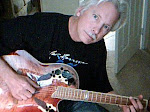
On November 3, U.S. President Richard Nixon speaks to the nation in a televised address regarding his plan to "Vietnamize" the war. In part, Nixon says "And now I would like to address a word, if I may, to the young people of this Nation who are particularly concerned, and I understand why they are concerned, about this war. I respect your idealism. I share your concern for peace. I want peace as much as you do."
Later in the speech, known forever after as Nixon's "Silent Majority speech, he adds "And so tonight-to you, the great silent majority of my fellow Americans - I ask for your support."
More than 500,000 protesters march on Washington, DC on November 15 demanding an end to the War in Vietnam. Sadly, Nixon did not appear to want peace "that" badly.
I was now becoming somewhat radicalized, albeit in a limited fashion. After several years of fence-sitting, trying to balance the patriotism that had been instilled in me as a young boy and my natural instinct that war was a terrible and senseless thing, I now firmly believed that the War in Vietnam must be stopped by any means short of violence. Or maybe some mild violence short of killing.
College and exposure to different people and ideas was beginning to change me. It was likely that I had my first (of many!) experience with marijuana that month, offered to me by my friends across the hall in my dorm. I was hesitant, but decided to take the plunge. It took several experiences before I got even a little high. One must remember that back then, a place like northern New York was virtually the last stop on the drug express, and the quality of the pot we were able to obtain was poor at best. Down to the stems and seeds again.
SUNY Potsdam still clung to many of the old college traditions, and the worst - to us - was the unequal treatment of women. Women had strict curfews; the men did not. Visitation in the dorms was limited to specific times and places. Certainly not in a "room" and certainly not with the door closed. One night, a large group of students, enraged by college policies, the war, and just about everything else, marched down to the President's house to demand change. The Potsdam police even followed us and eventually broke the demonstration up. It was a small taste of the firestorm that erupt a few months later when the Kent State killings occurred on May 4, 1970. Then, our campus, and those across the country, became engulfed in bitter protest. Most, like Potsdam State, shut down early that May.
The Rolling Stones release their landmark album Let It Bleed on November 28.

On November 1, Elvis Presley's Suspicious Minds reaches #1 on the U.S. pop charts. It was his last number one hit prior to his death in 1977.
Sesame Street premiers on the then National Educational Network, the predecessor of PBS.
On November 19, the 3rd and 4th humans walk on the Moon - Charles Conrad and Alan Bean of Apollo 12.
The United States Senate votes down President Nixon's nomination of Clement Haynsworth of South Carolina to a seat on the Supreme Court. Unlike today's highly partisan Congressional politics, 17 Republican senators join 38 Democrats to reject the nomination.
John Lennon returns his MBE to the British Government in protest of the War in Vietnam.
Journalist Seymour Hersh breaks the story of the March, 1968 massacre of civilians near My Lai in South Vietnam.
Born on November 4, American rapper Sean "Diddy" Combs. On November 18, Kennedy family patriarch Joseph P. Kennedy dies.
Native American activists seize Alcatraz Island in San Francisco Bay with the goal of gaining deed to the island. The occupation lasts until June, 1971.
On November 30, song-duo Simon and Garfunkel present a one hour television special entitled "Songs of America" which featured anti-war and other anti-establishment themes. I remember watching it and being affected deeply. The 60s were drawing to a close.





No comments:
Post a Comment